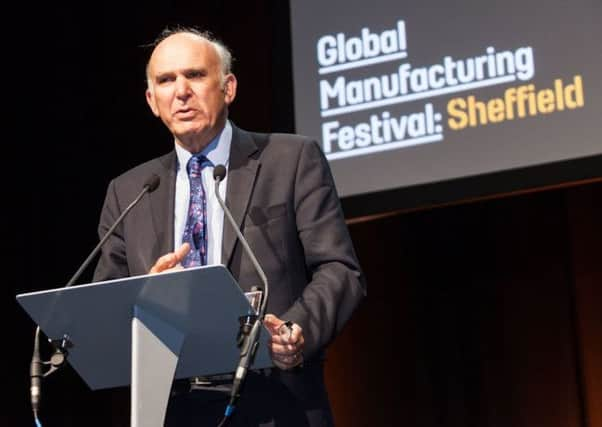British Army reduced to largely “ceremonial role,” Cable claims


He fears with the general election just months away Chancellor George Osborne is “veering off to extreme ideology” at a time when parties were jostling for position ahead of an election widely predicted to fail to deliver any party an overall Commons majority.
The Liberal Democrat Minister claimed Home Office spending would roughly halve.
Advertisement
Hide AdAdvertisement
Hide Ad“There is a table in the documentation behind the Autumn Statement which suggests that if the plans were realised we would roughly halve the total spending on the Home Office, ie the police, on the defence services, and our armed forces would become largely ceremonial,” Mr Cable said.
“It would be devastating and it would be ideologically driven and I would be very strongly opposed. It actually destroys public services in this country in the way we know them.
“Just continuing this on ideological grounds is very, very foolish,” he told BBC1’s Andrew Marr Show.
His warning comes after the independent Office for Budget Responsibility predicted the public sector would have to shrink to a size not seen since the 1930s to hit the Chancellor’s budget deficit forecasts.
Advertisement
Hide AdAdvertisement
Hide AdMr Cable, who has told his officials not to engage with Treasury work on cuts for the next parliament, said Autumn Statement proposals for further deep reductions in budgets had not been signed off by his party.
The minister did not rule out another power-sharing deal with the Conservatives if, no party won an overall Commons majority in the election, and said there remained “a lot of common ground” between them. But he pointed to a poll showing voters, especially Tories themselves, considered the party to be further to the right than Ukip as evidence of a major lurch to more extreme positions.
But Mr Osborne dismissed suggestions his economic plans were ideologically driven.
“For people who say, ‘Well, you know, is that too ideological?’, I would say look at Sweden,” he said in an interview on BBC 5 Live’s Pienaar’s Politics recorded before Mr Cable’s remarks.
Advertisement
Hide AdAdvertisement
Hide Ad“You’ve got a social democratic government there that introduced a surplus rule and that’s helped Sweden get through all its problems of the world economy in the last 15 years.
“This is a sensible modern approach to managing your public finances in a very competitive global economy where you do not know what is round the corner.”
He said: “I inherited a situation as chancellor where we had this record deficit.
“It’s come down by half but clearly the job isn’t done and what I’m saying is let’s not speed up, let’s not slow down, let’s continue at the pace we’ve been on over these last few years and getting that deficit down, and then getting our debts down as a country so we can deliver greater economic security.”
Advertisement
Hide AdAdvertisement
Hide AdLabour questioned why the Chancellor had not - as promised in the Autumn Statement - yet set out details of legislation enshrining in law a commitment to eliminate the deficit on day-to-day spending by Government departments by 2017-18.